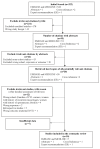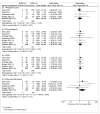The association of factor V leiden and prothrombin gene mutation and placenta-mediated pregnancy complications: a systematic review and meta-analysis of prospective cohort studies
- PMID: 20563311
- PMCID: PMC2885985
- DOI: 10.1371/journal.pmed.1000292
The association of factor V leiden and prothrombin gene mutation and placenta-mediated pregnancy complications: a systematic review and meta-analysis of prospective cohort studies
Abstract
Background: Factor V Leiden (FVL) and prothrombin gene mutation (PGM) are common inherited thrombophilias. Retrospective studies variably suggest a link between maternal FVL/PGM and placenta-mediated pregnancy complications including pregnancy loss, small for gestational age, pre-eclampsia and placental abruption. Prospective cohort studies provide a superior methodologic design but require larger sample sizes to detect important effects. We undertook a systematic review and a meta-analysis of prospective cohort studies to estimate the association of maternal FVL or PGM carrier status and placenta-mediated pregnancy complications.
Methods and findings: A comprehensive search strategy was run in Medline and Embase. Inclusion criteria were: (1) prospective cohort design; (2) clearly defined outcomes including one of the following: pregnancy loss, small for gestational age, pre-eclampsia or placental abruption; (3) maternal FVL or PGM carrier status; (4) sufficient data for calculation of odds ratios (ORs). We identified 322 titles, reviewed 30 articles for inclusion and exclusion criteria, and included ten studies in the meta-analysis. The odds of pregnancy loss in women with FVL (absolute risk 4.2%) was 52% higher (OR = 1.52, 95% confidence interval [CI] 1.06-2.19) as compared with women without FVL (absolute risk 3.2%). There was no significant association between FVL and pre-eclampsia (OR = 1.23, 95% CI 0.89-1.70) or between FVL and SGA (OR = 1.0, 95% CI 0.80-1.25). PGM was not associated with pre-eclampsia (OR = 1.25, 95% CI 0.79-1.99) or SGA (OR 1.25, 95% CI 0.92-1.70).
Conclusions: Women with FVL appear to be at a small absolute increased risk of late pregnancy loss. Women with FVL and PGM appear not to be at increased risk of pre-eclampsia or birth of SGA infants. Please see later in the article for the Editors' Summary.
Conflict of interest statement
MAR is the principal investigator of a Canadian Institutes of Health Research randomised trial comparing dalteparin to no dalteparin to prevent placenta-mediated pregnancy complications in thrombophilic women. MAR has received grant funding from Pfizer, Sanofi, Boehringer Ingelheim, Bayer, GTC Therapeutics, and Leo Pharma. MAR has also served on advisory boards for Boehringer Ingelheim and Biomerieux but not been paid. IAG has received Honoraria for lectures and advisory boards from Sanofi Aventis and Leo Pharma.
Figures





Similar articles
-
Screening for thrombophilia in high-risk situations: systematic review and cost-effectiveness analysis. The Thrombosis: Risk and Economic Assessment of Thrombophilia Screening (TREATS) study.Health Technol Assess. 2006 Apr;10(11):1-110. doi: 10.3310/hta10110. Health Technol Assess. 2006. PMID: 16595080
-
Association Between Factor V Leiden Mutation, Small for Gestational Age, and Preterm Birth: A Systematic Review and Meta-Analysis.J Obstet Gynaecol Can. 2016 Oct;38(10):897-908. doi: 10.1016/j.jogc.2016.08.001. J Obstet Gynaecol Can. 2016. PMID: 27720088
-
Factor V Leiden mutation in women with early recurrent pregnancy loss: a meta-analysis and systematic review of the causal association.Arch Gynecol Obstet. 2015 Mar;291(3):671-9. doi: 10.1007/s00404-014-3443-x. Epub 2014 Sep 6. Arch Gynecol Obstet. 2015. PMID: 25193429
-
Multiple-micronutrient supplementation for women during pregnancy.Cochrane Database Syst Rev. 2017 Apr 13;4(4):CD004905. doi: 10.1002/14651858.CD004905.pub5. Cochrane Database Syst Rev. 2017. Update in: Cochrane Database Syst Rev. 2019 Mar 14;3:CD004905. doi: 10.1002/14651858.CD004905.pub6. PMID: 28407219 Free PMC article. Updated.
-
Predictive value of factor V Leiden and prothrombin G20210A in adults with venous thromboembolism and in family members of those with a mutation: a systematic review.JAMA. 2009 Jun 17;301(23):2472-85. doi: 10.1001/jama.2009.853. JAMA. 2009. PMID: 19531787
Cited by
-
Association Between Gene Polymorphisms on Chromosome 1 and Susceptibility to Pre-Eclampsia: An Updated Meta-Analysis.Med Sci Monit. 2016 Jun 27;22:2202-14. doi: 10.12659/msm.896552. Med Sci Monit. 2016. PMID: 27348238 Free PMC article.
-
Thrombophilia screening in women with recurrent first trimester miscarriage: is it time to stop testing? - a cohort study and systematic review of the literature.BMJ Open. 2022 Jul 13;12(7):e059519. doi: 10.1136/bmjopen-2021-059519. BMJ Open. 2022. PMID: 35831047 Free PMC article.
-
The association of thrombophilia in women with severe obstetric complications.J Med Life. 2022 Oct;15(10):1299-1304. doi: 10.25122/jml-2022-0182. J Med Life. 2022. PMID: 36420283 Free PMC article.
-
Recurrent pregnancy loss in a subject with heterozygote factor V Leiden mutation; a case report.Rep Biochem Mol Biol. 2014 Apr;2(2):98-102. Rep Biochem Mol Biol. 2014. PMID: 26989729 Free PMC article.
-
Perinatal death investigations: What is current practice?Semin Fetal Neonatal Med. 2017 Jun;22(3):167-175. doi: 10.1016/j.siny.2017.02.005. Epub 2017 Mar 18. Semin Fetal Neonatal Med. 2017. PMID: 28325580 Free PMC article. Review.
References
-
- Brenner B. Antithrombotic prophylaxis for women with thrombophilia and pregnancy complications - Yes. J Thromb Haemost. 2003;1:2070. - PubMed
-
- Brenner B. Thrombophilia and adverse pregnancy outcome. Obstet Gynecol Clin North Am. 2006;33:ix. - PubMed
-
- Rodger MA, Paidas M, McLintock C, Middeldorp S, Kahn S, et al. Inherited thrombophilia and pregnancy complications revisited. Obstet Gynecol. 2008;112:320. - PubMed
-
- Kujovich JL. Thrombophilia and pregnancy complications. Am J Obstet Gynecol. 2004;191:412. - PubMed
-
- Brown K, Luddington R, Williamson D, Baker P, Baglin T. Risk of venous thromboembolism associated with a G to A transition at position 20210 in the 3′-untranslated region of the prothrombin gene. Br J Haematol. 1997;98:907. - PubMed
Publication types
MeSH terms
Substances
LinkOut - more resources
Full Text Sources
Other Literature Sources
Medical

